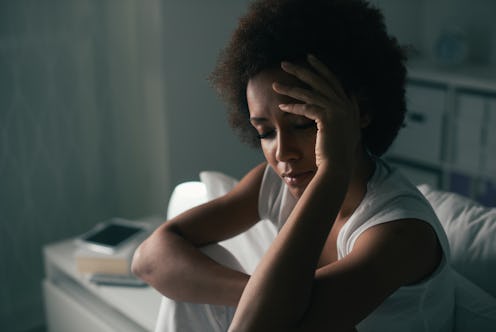Life
9 Signs Your Body Can't Tolerate Grains

While you may think of grains as a go-to, easy item to have around, grains may be cause your body more harm than good. As someone with celiac disease, I'm very familiar with the negative effects grains can have on a person's body. However, the term "grains" goes even beyond gluten. Grains are any food that is or has been created with wheat, rice, oats, cornmeal, barley or any cereal grain. So how do you know if grains aren't being tolerated by your body?
First, it's important to identify why grains may be bothering you. "Because wheat products are so processed and typically genetically modified today, more and more people are suffering from a grain intolerance, even if they don’t have celiac disease or a wheat allergy," Dr. Josh Axe, D.N.M., C.N.S., D.C., author, founder of DrAxe.com and co-founder of Ancient Nutrition, tells Bustle. "Both gluten-containing grains and even some gluten free grains are causing inflammation and chronic digestive problems among people with a sensitivity to these foods."
If you're unsure if grains are what's upsetting your body, try making adjustments and seeing how you feel. "To follow a grain-free diet, you have to eliminate both gluten-containing and gluten-free grains, including rice, oats, corn and barley," Dr. Axe says. "Some foods that aren’t technically grains, like quinoa, buckwheat and amaranth, are allowed, but only in small quantities."
If you think grains are upsetting your body and do decide to eliminate grains, you can maintain your carbohydrate intake through foods such as sweet potatoes, carrots, meats, and nuts, says Dr. Axe. Wondering if it makes sense to make adjustments? Here are the signs your body isn't tolerating grains to give you a better idea.
1Acne
If you start breaking out but haven't changed anything in your skincare routine, it's likely that your body is reacting to something in your diet. When your body is unable to digest a food, it tries to rid itself of it through the skin, leading to acne. This can commonly happen with grains, leading to acne, says Rodale Wellness.
2Bloating
If your body is unable to digest grains, they end up sitting in the small intestine much longer than other food and ferment with gut bacteria, reports One Green Planet. This, in turn, leads to your body bloating.
3Skin Reactions
When your body is unable to tolerate the grains you're eating, it can cause a variety of skin reactions from dryness to itchiness, says Rodale Wellness. If you notice that you've been experiencing hives or your eczema has been acting up, look at your diet to see if grains may be the culprit.
4Inflammation
As the grains sit in your small intestine it can start to become inflamed, according to One Green Planet. The pain can begin right after eating and last for some time. If you've noticed you are experiencing pain after consuming food, try making adjustments.
When I was still eating gluten, I felt pain every time I ate, not just the times I ate gluten since my small intestine was already damaged and the food aggravated it.
5Anemia
Consuming grains is actually the second most common reason for anemia, only falling behind blood loss, says Rodale Wellness. In two slices of whole wheat bread there is enough phytate to block up to 90 percent of your iron absorption. If grains are a huge part of your diet then it may be causing you to become anemic.
6Headaches
When I eat gluten by accident, I can get killer headaches. Dr. Axe says this symptom leads to discomfort from your body not being able to process a food such as grains.
7Fatigue
Feeling lethargic or fatigued can be a huge sign that you are intolerant to something you're eating, according to The University of Chicago Celiac Disease Center. If your body is unable to process the nutrients in what you're eating, then you can not turn that food into energy, thus leading to you becoming more tired.
8Brain Fog
When trying to process foods that your body can not digest, it's common to experience brain fog. Take this as a sign that your brain is trying to send you that something you ate did not sit right with your body and should be avoided in the future.
9Anxiety
It feels like anything can make us anxious now-a-days, even the ingredients in our foods. Dr. Axe says that anxiety is a sign to watch out for after eating. If you find it coupled with one of the other symptoms it can be a sign that grains are not for you.
If you've noticed yourself feeling one or more of these symptoms, it's important to consult your doctor to discuss your options. While grains do make up a wide range of our diets, they are not a necessity if they are doing your body more harm than good.